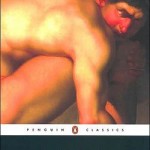 Title: Interview with the Vampire (Goodreads)
Title: Interview with the Vampire (Goodreads)
Author: Anne Rice
Series: The Vampire Chronicles #1
Published: Sphere, 1976
Pages: 308
Genres: Gothic
My Copy: Paperback
Buy: Amazon, Book Depository, Kindle (or visit your local Indie bookstore)
When people talk about Anne Rice, you can be sure that the first novel in the Vampire Chronicles, Interview with the Vampire, will be mentioned. Easily her most recognisable novel, this 1976 debut tells the story of three very different vampires. Focusing on the two hundred year old, Louis, the book tells how Lestat turned him as well as five-year-old Claudia, and his life as a vampire as he conveys it to a reporter. This breakout novel even spawned the hit 1994 adaptation starring Tom Cruise, Brad Pitt and Kirsten Dunst.
I first read Interview with the Vampire when I first got into reading and really enjoyed it. In that review I gave it high praises, saying, “The whole story is almost philosophical in the way it tells the struggle of Louis and his moral conscience…[A] battle of good and evil is played out in a more evil orientated world… It doesn’t feel forced or predictable it just leaves you thinking how wonderfully complex these characters are.” Looking back on that review with a fresh re-read and five more years of reading experience, I have a very different opinion.
First of all, the vampire mythology is an interesting literary device to explore morality. Looking back on the mythology, all the way to classics like Dracula; novels continue to explore the morality of a powerful vampire sucking the life away from the innocent. What gives them the right to life over everyone else? There is a conflict between morality and the idea of survival. Within Interview with the Vampire it does this in two distinct ways; first you have Lestat who takes life without a care in the world, following the instincts of survival. While Louis is often questioning his survival and the moral implications, often hating what he has become.
The novel spans the life of Louis for the past two hundred years, though Interview with the Vampire is just over 300 pages. For me this becomes the biggest downfall of the book, and the character development, especially the psychological, suffers. There are a lot of interesting topics that this novel could have explored but we never get the opportunity to do so in great detail. Take for example, Claudia; she has many years to live and learn about life, and this could have made for a far greater story. The struggles Claudia went through would have been fascinating, especially the sexual development of a girl stuck in a five-year-olds body.
It is interesting to see how much a few years has changed my view on literature; I feel like I am developing some useful skills to analyse the books. I also feel like I am getting to the point where I am starting to feel like I am ‘well read’ (although there is a long way to go). Having experienced more with the vampire mythology and literature in general, I am enjoying going back to some of the books I read more than five years ago. Sometimes I do not enjoy the novel as much, like I did this time, but other times I find a new found respect for what an author was trying to do (see a future review of The Handmaid’s Tale). Interview with the Vampire could have been so much more, and now I just wish it was.











Its probably a good effort for a debut novel, which we shouldn’t forget. While you grow as a reader, the book stays the same. Perhaps if she could rewrite, there would be different aspects that she would now include in it that she didn’t originally. But i think we still need to remember that this was her first novel.
I’d be interested to read what the book would be life, if she rewrote it now.